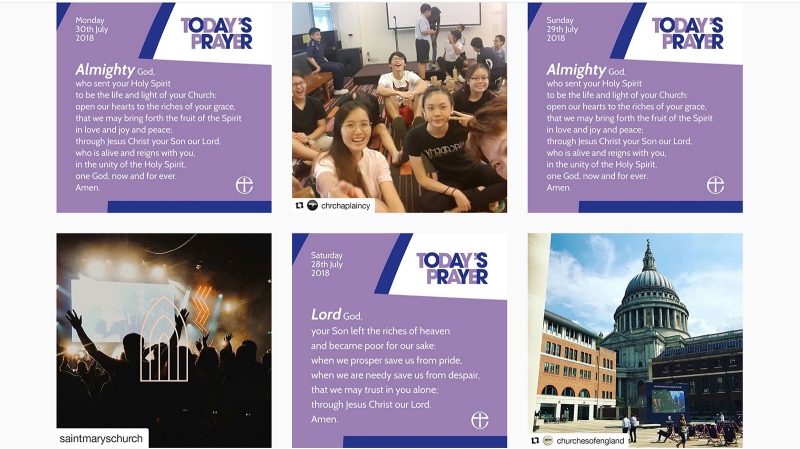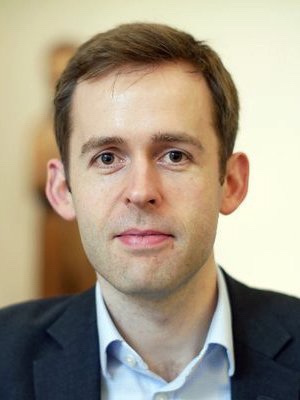
For the past two years the Church of England has committed itself to developing a strong presence online, with a particular target of attracting people who do not regularly go to church. CATHERINE PEPINSTER, of Religion News Service, reports…
London, UK
RNS
It’s not particularly news in Britain that young English people no longer automatically consider themselves Anglican. A government survey released this month was only the latest to confirm that “CoE” – Church of England – was no longer the default response when Englanders were asked their religion or checked a box on a form.
What’s new, however, is that the Church of England is not sitting back and accepting decline. The nearly 500-year-old denomination is answering back, via Instagram.

Posts on the Church of England Instagram feed. PICTURE: Screengrab via Instagram.
The UK’s annual British Social Attitudes Survey reported that only two per cent of 18 to 24-year-olds identify with the Church of England, the established religion of the realm since the Reformation.
Overall, in fact, fewer than one in seven of the English say they belong to the Church of England. Between 2002 and 2017, the share of the populace identifying with the church dropped from 31 per cent to 14 per cent. That was a faster decline than any other Christian denomination in England.
Fewer than one in seven of the English say they belong to the Church of England. Between 2002 and 2017, the share of the populace identifying with the church dropped from 31 per cent to 14 per cent. That was a faster decline than any other Christian denomination in England.
This puts a new spin on the common story of an increasingly secular Britain. The Church of England isn’t only losing members who have lost their faith; it is also losing them to other denominations.
“It has been clear for some time that we have moved from an era of people automatically classifying themselves as Church of England or Anglican to one in which identifying faith is an active choice,” said David Male, the Church of England’s director of evangelism and discipleship. “But people of all ages have not stopped searching for meaning and answers in their life.”
Indeed, further research shows that rather than belonging to one denomination all their lives, they move about according to spiritual and liturgical taste.
The research organisation ComRes found in a June 2017 survey that 21 per cent of teenagers in Britain identified as active followers of Jesus. At least one in six wanted to know more about Jesus or were interested in spiritual experience.
“We keep finding not so much a reluctance to admit to religious faith, but they have a lack of confidence about it,” said Nick Shepherd, who works for the Church of England project Setting God’s People Free. “People are very private in their beliefs.”
Rather than adhering to a denomination, the current generation is concerned with finding a community that fits. “They might move from an Anglican to a Baptist church,” said Katie Harrison, head of the Faith Research Center at ComRes, “and for the most part they find the services and community life fairly similar.”
When young Brits do stick with a denomination, it is often because of their ethnic or national heritage. “Roman Catholic cultural identity is very strong, especially in migrant communities. Such a cultural identity is not as strong for Anglicans,” said Shepherd.
What gives England’s state church hope is that many young Brits are turning to the internet to pray. Some 1.2 million Brits pray online each month, according to Church of England data, and they are using Church of England guides to do so.
For the past two years the Church of England has committed itself to developing a strong presence online, with a particular target of attracting people who do not regularly go to church. It uses Twitter, Facebook, Instagram and its website to reach young people.
The church’s content includes images, film, information about local churches and help in learning to pray – including using Amazon Alexa to hear grace before meals and other devotions read aloud for them.
At Christmas last year there were 6.8 million users of its material. In June 2017 after a terrorist attack on London Bridge that coincided with Pentecost, 1.5 million went on Facebook to find comfort in verses from the Gospel of John – “The light shines in the darkness and the darkness has not overcome it,” with film of a lit candle.

Adrian Harris. PICTURE: Courtesy of Church of England
“We’re seeing encouraging signs but it will take time to translate into more people going to church.”
– Adrian Harris, the Church of England’s head of digital.
Adrian Harris, the Church of England’s head of digital, said the aim is to draw people to Christian worship long term. “The key part of our role is to use social media and the website to enable people to develop a relationship with God and our churches.” The church website’s “find a church near you” is getting 10 million page views a year. Half of the church’s traffic to Instagram is under the age of 34.
“We’re seeing encouraging signs but it will take time to translate into more people going to church,” said Harris, a former head of digital for a major supermarket retailer.
In a generation in which seekers are looking for community, the Church of England is able to offer the ultimate in togetherness: Justin Welby, the Archbishop of Canterbury, has been helping to foster a revival of interest in people joining religious communities.
While commitments to traditional monastic orders have declined, there has been an increase of interest in what are called “acknowledged communities,” in which people between 20 and 35 live and work outside a monastery or convent. There is no vow of celibacy required.
In 2015, Welby launched the Community of St Anselm, based at his London home, Lambeth Palace, which people join for a year.
Writing in the Church Times on 7th September, Welby said, “Commitment-phobia in our culture was felt to be deterring many from just about the biggest commitment you can make: staking everything on God and joining a religious community for life.”
Now, he said: “We are witnessing a revival of interest in community life in its different forms.”





